Derogatory ‘R’ word removed from Colorado statutes
March 21st, 2018 by Global Down Syndrome Foundation
On the Eve of Omnibus Spending Negotiations Republicans and Democrats Agree to Support Down Syndrome Research
March 21st, 2018 by Global Down Syndrome Foundation
On the Eve of Omnibus Spending Negotiations Republicans and Democrats Agree to Support Down Syndrome Research
March 21st, 2018 by Global Down Syndrome Foundation
Groundbreaking Research Grants announced on World Down Syndrome Day
DENVER – Wednesday, March 21, 2018 – With partisan politics threatening to lead to a government shutdown, First Lady Valerie Sununu (R-New Hampshire) and First Lady Robin Hickenlooper (D-Colorado) have joined forces to celebrate World Down Syndrome Day and to support Down syndrome research.
The two first ladies have organized the Light the Way Campaign to shine a light on the groundbreaking research advances being made to empower individuals with Down syndrome. They have enlisted other first spouses from Arkansas, Indiana, Minnesota, New Mexico, North Caroline, Ohio, Oklahoma, Pennsylvania, Tennessee, Texas, Virginia, West Virginia, Wyoming, where the Governors’ residences or capitols will be decorated in the Down syndrome colors of blue and yellow and proclamations made. The campaign initiative was started in 2011 by Patricia White, a parent-advocate, and former First Lady Mary Pat Christie of New Jersey.
The campaign follows on the heels of the first congressional hearing late last year which was focused on Down syndrome research and the lack of National Institutes of Health funding for the condition. At the hearing the Global Down syndrome Foundation’s Quincy Jones Advocate, Frank Stephens, provided testimony that brought the bi-partisan U.S. House of Representatives Appropriations Subcommittee on Labor, Health and Human Services, and Education to its feet when he exclaimed, “I am a man with Down syndrome and my life is worth living.” Stephen’s testimony on C-SPAN went on to receive over 160 million views.
The two first ladies were deeply moved by Stephen’s testimony and Global’s decade long work with congress to increase funding for Down syndrome research. “I am excited to take on this initiative, as advocating for people with Down syndrome is a main focus of mine as First Lady of New Hampshire,” said Sununu. “We are grateful to Patricia White and former First Lady Christie for starting this important campaign, and we are pleased to have partnered with the leading research non-profit in the field, the Global Down Syndrome Foundation, and we encourage our colleagues to spread awareness for the Light the Way Campaign by using #GlobalLightsTheWay.”
“Colorado is proud to support the Light the Way campaign as more can and should be done to support people with Down syndrome,” said Robin Hickenlooper, First Lady of Colorado. “Global has helped the scientific community make giant strides in improving the lives of those with the condition. We know that with additional funding and support, the next breakthrough is just on the horizon.”
To commemorate World Down Syndrome Day in Colorado, Governor John Hickenlooper received hundreds of participants from around the state at the Capitol where Global’s affiliate, the Crnic Institute for Down Syndrome at University of Colorado School of Medicine on the Anschutz Medical Campus announced $800,000 in Grand Challenge Grant Awards to outstanding Down syndrome research that stands to benefit people with Down syndrome.
“The 2018 Grand Challenge Grant Award winners represent some of the best science that exists today,” said Joaquín Espinosa, Executive Director of the Crnic Institute, Director of The Functional Genomics Facility, and Co-Leader of the Molecular Oncology Program at the University of Colorado Cancer Center on the Anschutz Medical Campus. “We are looking at Down syndrome as an immune system disorder and coming up with ways that can lead to improved health outcomes. It is a very exciting time to be engaged in Down syndrome research.”
The Crnic Grand Challenge Grants annual program was established in 2013 by Tom Blumenthal, Ph.D., director emeritus of the Crnic Institute. To date, Global has helped to underwrite more than $6 million in grants to 42 researchers and scientists from Colorado.
This year’s winners are primarily focused on medical research and scientific studies that will benefit people with Down syndrome, while also providing critical research that may benefit the typical population. The 2018 Grand Challenge Grant Award winners include:
Causes and consequences of altered DNA repair in Down syndrome.
Defects in DNA repair could contribute to increased risk of leukemias and premature aging in people with Down syndrome. James DeGregori and Jay Hesselberth will use newly developed technologies to assess how well DNA repair processes work and how often DNA mutations occur in the cells of individuals with Down syndrome.
Impact of trisomy 21 on B cell function in adults with Down syndrome.
People with Down syndrome have an increased susceptibility to bacterial pneumonia and may respond differently to vaccinations, two phenomena with mechanisms rooted in the immune system. Edward Janoff and Stephanie James will evaluate how the immune system of adults with Down syndrome responds to stimuli such as vaccination or bacterial infection, by characterizing B cells, the immune cells that produce antibodies.
Mechanisms of reduced allergic sensitization in Down syndrome.
Richard Lee Reinhardt will explore whether children with Down syndrome have a marked decrease in susceptibility to allergic diseases. He will also test whether increased expression of a specific gene located on chromosome 21, called Runx1, contributes to this decrease in allergic sensitization. This novel work will contribute to the understanding of how allergic diseases develop in ALL people and how to best prevent it.
Role of Interferon and Interleukin-10 in susceptibility to severe pneumonia.
People with Down syndrome have increased rates and severity of pneumonia infection. Michael Yeager will continue his important work understanding how an increase of specific molecules in the immune system, called Interferons and Interleukin-10, contribute to an enhanced susceptibility to pneumonia infection in people with Down syndrome, and also why ALL people are more susceptible to bacterial pneumonia after viral infections like influenza.
Metabolic alterations caused by trisomy 21
The ‘metabolome’ is a collection of small biochemical molecules that act as a ‘fingerprint’ of virtually all cellular processes. In people with Down syndrome, the metabolome is altered and likely contains biomarkers that may help assess risk of and create therapeutic strategies for a variety of diseases with commonly co-occur with Down syndrome. Angelo D’Alessandro will continue to perform experiments to understand metabolic perturbations in people with Down syndrome.
Targeting dysregulated mitochondrial activity in DS-related Alzheimer’s disease.
Charles Hoeffer will continue to explore the role of RCAN1, a protein encoded on chromosome 21, in the development of Alzheimer’s disease. His studies seek to determine how increased expression of RCAN1 alters a cellular structure known as the mitochondria in neurons from people with Down syndrome, and whether RCAN1 could eventually be targeted with drugs to treat Alzheimer’s disease. This work will contribute to a valuable body of literature surrounding the relationship with Alzheimer’s disease and Down syndrome.
World Down Syndrome Day is a global awareness day which has been officially observed by the United Nations since 2012. The date – March 21 – has special meaning to the Down syndrome community as individuals with Down syndrome have three copies of chromosome 21.
###
About the Global Down Syndrome Foundation
The Global Down Syndrome Foundation is at the forefront of research, medical care, education and advocacy dedicated to significantly improving the lives of people with Down syndrome. Supporting the research of hundreds of scientists around the world, and through our advocates, partners and affiliates including the Crnic Institute for Down Syndrome and the Anna and John J. Sie Center for Down Syndrome, Global is making an impact on the lives of people with Down syndrome today, and remains focused on finding solutions tomorrow. We are committed to helping people with Down syndrome realize their fullest potential and to lead healthy and productive lives. To learn more, visit. www.globaldownsyndrome.org.
Why the Capitol Will Be Lit in Blue and Yellow This Wednesday
March 20th, 2018 by Global Down Syndrome Foundation
VeteransAgainstAlzheimer’s Applauds Congress For Introducing Bill Promising To Help Veterans With Alzheimer’s
March 18th, 2018 by Global Down Syndrome Foundation
Global president & CEO Michelle Sie Whitten and Global ambassador Sophia Whitten talked about the significance of World Down Syndrome Day
March 18th, 2018 by Global Down Syndrome Foundation
March 2018 Newsletter
March 17th, 2018 by Global Down Syndrome Foundation
Global buzzing about 2018 Gerber Spokesbaby, Bloomberg features Global’s Adult Guidelines, Quincy Jones Award, The Fray’s Isaac Slade and more!
Yesterday & Today: World Down Syndrome Day 2018
March 13th, 2018 by Global Down Syndrome Foundation
Global Down Syndrome Foundation recognizes World Down Syndrome Day as a chance to reflect on the progress we have made, and on our hopes for the future.
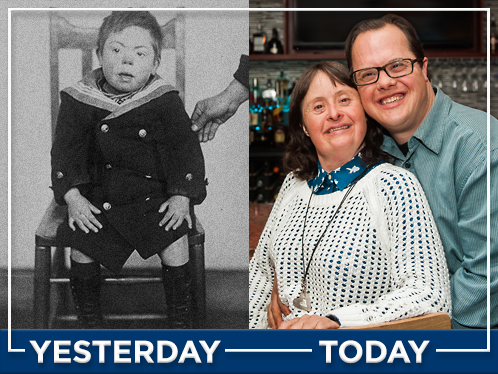 |
YESTERDAY: The life expectancy of a person with Down syndrome was only 28 years in the 1980s.
TODAY: Today in the US, the life expectancy is nearly 60 years!
The discrimination against people with Down syndrome can be profound. Children and adults with the condition are still deprived of lifesaving medical care. There are also too few medical professionals who understand that patients with Down syndrome are highly predisposed to certain diseases and highly protected from others.
At Global we are working to continue this significant increase of lifespan for people with Down syndrome through improved medical care.
 |
YESTERDAY: In the US, people with Down syndrome weren’t allowed to attend public schools until the 1970s.
TODAY: Students with special needs get a free and appropriate public education required by law.
Despite many advances since the 1970s, so many parents are still battling the education system to enforce their rights. At the same time they are trying to unlock how their children and adults with Down syndrome can learn better.
At Global we are working to help ensure improved health outcomes (including in sleep, speech, hearing and vision) that we believe will allow students with Down syndrome to reach their true potential.
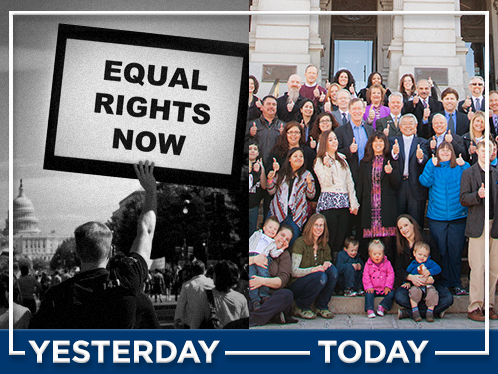 |
YESTERDAY: In the US, the accepted terminology for people with Down syndrome used to be “mongoloid” and “mentally retarded.”
TODAY: Thanks to Rosa’s Law, “mental retardation” was replaced with “intellectual and developmental disabilities” in all federal documents.
We believe in freedom of speech. But we also believe that our community must demand respect through language, and stand up to those who would bully us with words. Through our training and our advocacy we educate medical and research professionals in “people first” language and we have stood up to bullies using the “R” word and worse.
At Global we are advocating for equality and respect in Washington, D.C. and throughout the world.
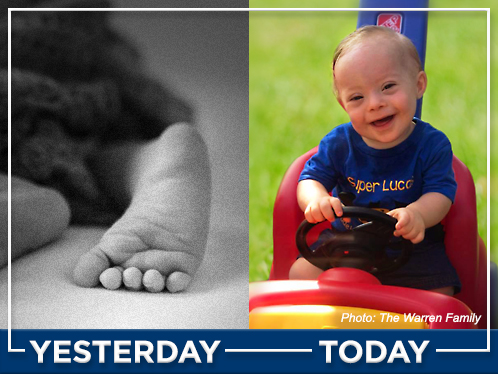 |
YESTERDAY: In U.S. hospitals, starving a baby to death with Down syndrome, or another intellectual disability, was allowed until the 1981 passing of the “Baby Doe Law.”
TODAY: This year we are celebrating Lucas Warren as the “healthy, happy, perfect” 2018 Gerber Spokesbaby – Lucas happens to have Down syndrome!
In Iceland, Denmark and other countries where the government boasts a “Down syndrome-free” future, the eugenics framework is marked and frightening. Standing on the shoulders of our human and civil rights predecessors of the 1960s and 1970s, we must be vigilant to ensure that our children and adults have rights, and are valued, equal citizens – in the U.S. and abroad.
Global advocates for our government to invest in people with Down syndrome and for people with the condition to be recognized throughout the world.
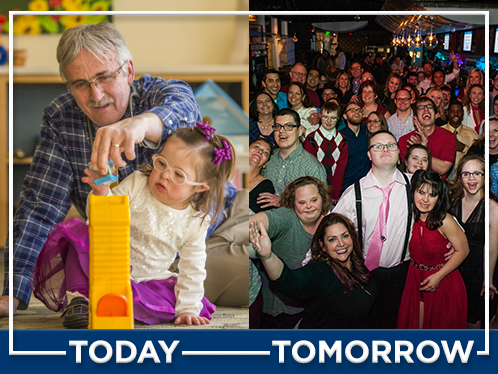 |
TODAY: The Sie Center for Down Syndrome at Children’s Hospital Colorado provides life-saving and life-changing medical care to over 1,400 children with Down syndrome.
TOMORROW: Global envisions a world where we are able to establish a network of pediatric AND adult medical centers providing EXCELLENT care to millions of people with Down syndrome!
On this World Down Syndrome Day, Global is grateful for the amazing progress we have made together—we have created a pipeline of excellent science that informs our excellent medical care benefitting thousands of people with Down syndrome.
To be sustainable and to GROW so as to help ever more people with Down syndrome, we are grateful to you for your on-going support and trust in us to make a positive, tangible difference.
THANK YOU for allowing us to save and improve lives. Happy World Down Syndrome Day!!
2019 World Down Syndrome Day
March 13th, 2018 by Global Down Syndrome Foundation
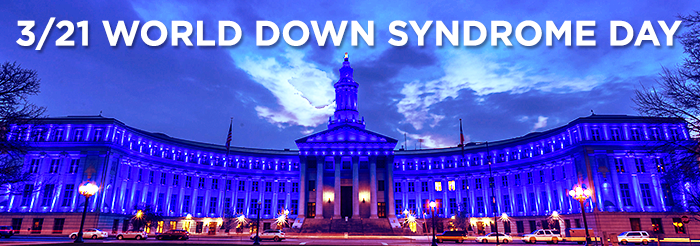
Thursday, March 21st, 2019
Join Global Down Syndrome Foundation, the Linda Crnic Institute for Down Syndrome and the Anna and John J. Sie Center for Down Syndrome for a celebration at the Colorado State Capitol!
The Global team, self-advocates, and other organizations serving the differently-abled will enjoy a fun photo op followed by announcements and light refreshments.
If you have any questions please contact: events@globaldownsyndrome.org or call 720-548-5626.
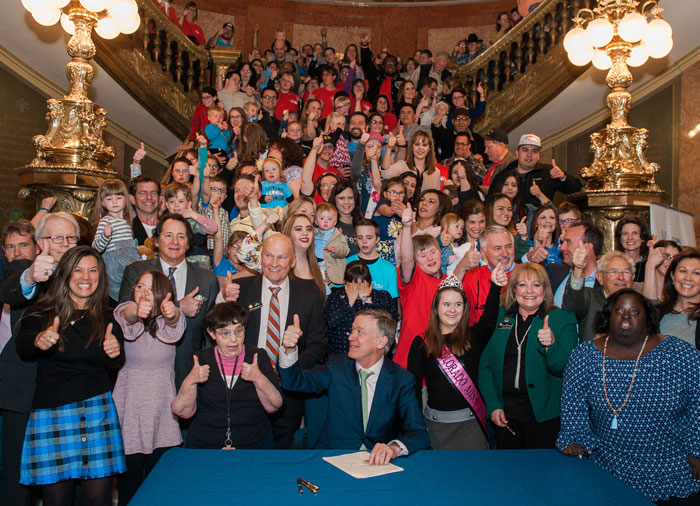
Babies with Down syndrome are put on center stage in the U.S. abortion fight
March 6th, 2018 by Global Down Syndrome Foundation

 Experience our inspirational and groundbreaking videos and photos. Our children and self-advocates are beautiful AND brilliant!
Experience our inspirational and groundbreaking videos and photos. Our children and self-advocates are beautiful AND brilliant! Make sure your local Representatives are on the Congressional Down Syndrome Task Force.
Make sure your local Representatives are on the Congressional Down Syndrome Task Force.